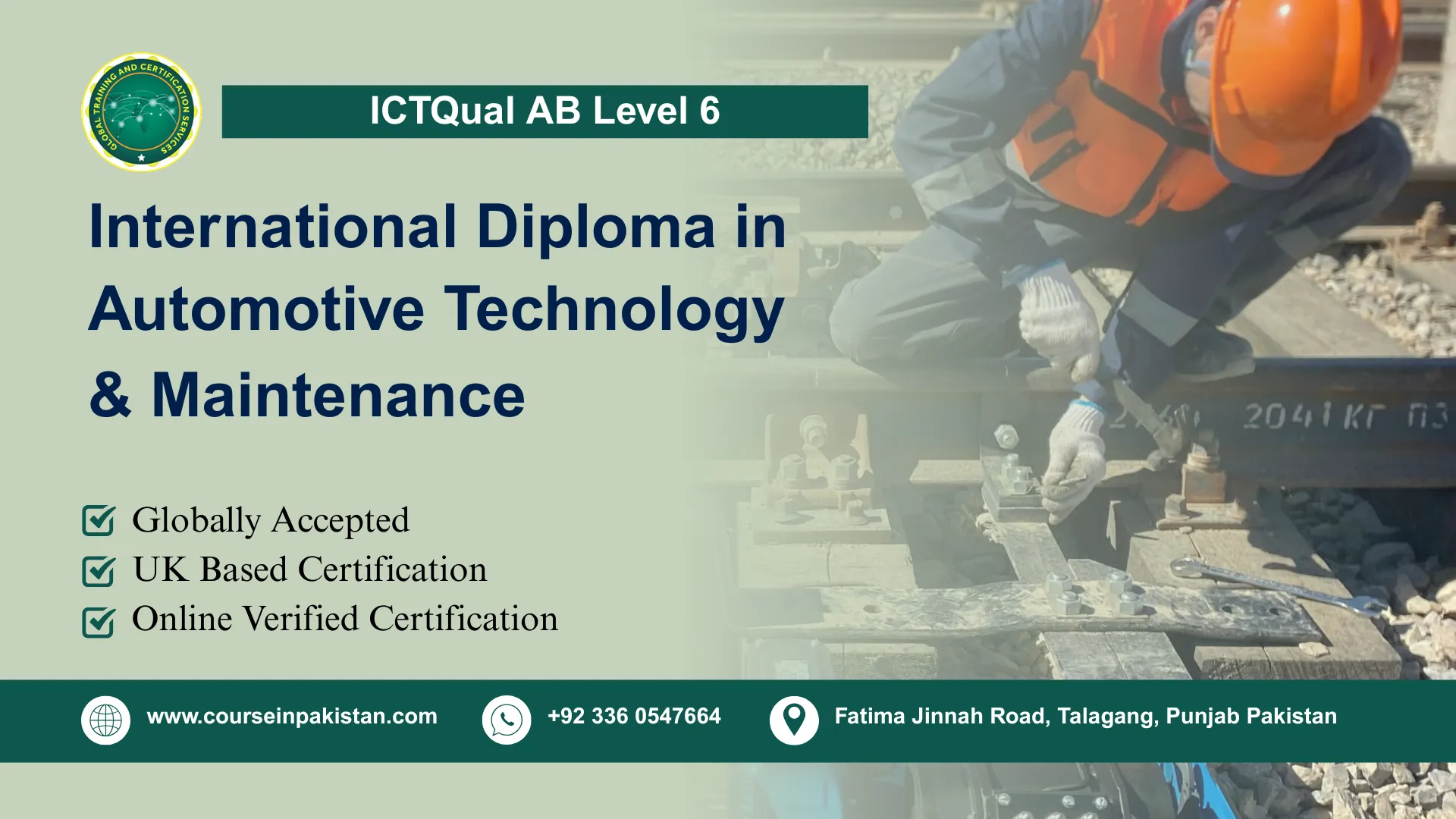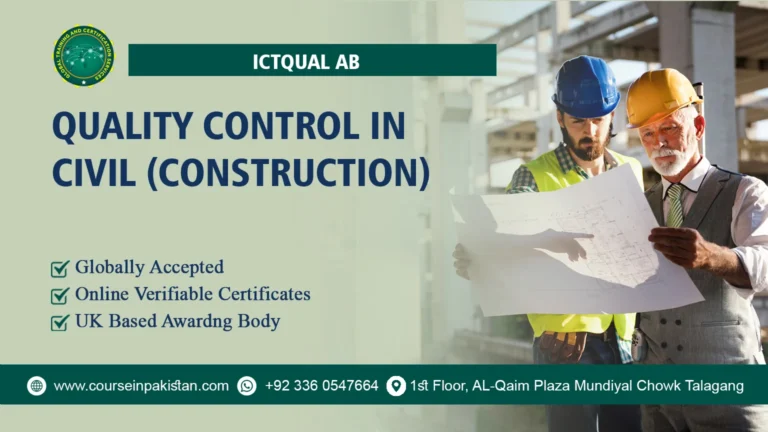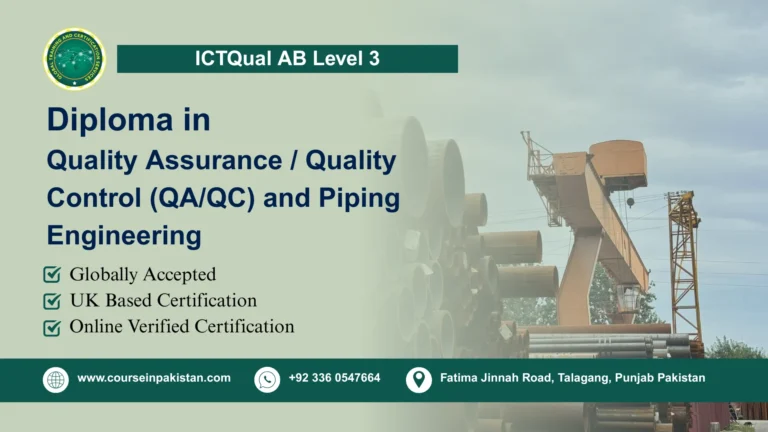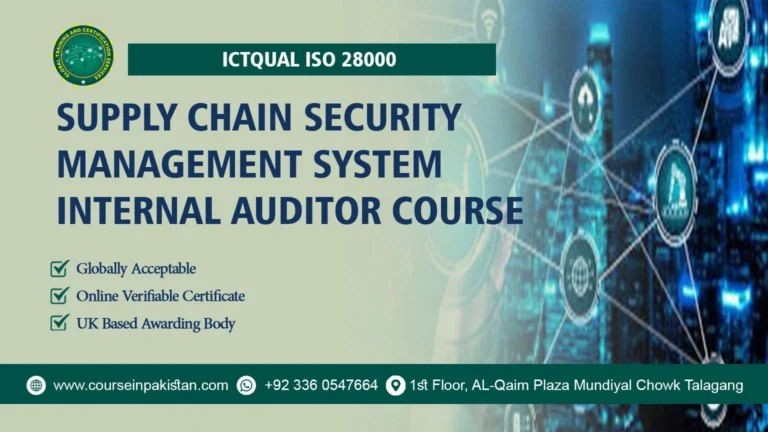
The automotive industry is rapidly evolving, with new technologies, innovations, and maintenance practices shaping the future of transportation. The ICTQual AB Level 6 International Diploma in Automotive Technology & Maintenance is a comprehensive qualification designed to equip learners with advanced knowledge and practical skills in vehicle engineering, diagnostics, repair, and maintenance. This diploma offers a structured pathway for individuals who aspire to excel in the automotive sector, whether as skilled technicians, supervisors, or technical managers.
Learners will explore a wide range of modules covering vehicle systems, modern automotive technologies, preventive maintenance, diagnostics, quality assurance, and sustainable practices in the automotive industry. The course combines theoretical knowledge with practical understanding, preparing students to tackle real-world challenges in both traditional and modern automotive environments. By the end of this program, learners will have developed technical expertise, problem-solving skills, and leadership qualities necessary for a successful career in the automotive and transport industries worldwide.
Course Overview
The ICTQual AB Level 6 International Diploma in Automotive Technology & Maintenance is a 360-credit qualification that is entirely assignment-based, making it highly flexible for learners worldwide. Candidates can complete it at their own pace and from anywhere in the world. This prestigious certification is British Council verifiable, MOFA and Embassy attestable, and recognized as one of the most credible qualifications for employment, professional growth, and iqama approval.
This diploma is suitable for both fresh and experienced candidates. Fresh learners must complete 36 mandatory assignments within 3 years, while experienced professionals with at least 6 years of verifiable relevant experience may qualify through the Recognition of Prior Learning (RPL) route. In this pathway, they can earn the diploma by defending their expertise in professional discussion meetings with ICTQual AB approved assessors—allowing them to achieve certification in a shorter time without completing all assignments.
This course ensures career growth in areas such as automotive engineering, maintenance management, diagnostic services, and technical leadership. It also provides learners with an internationally recognized qualification that enhances employability and opens global opportunities in the automotive industry.
Key Highlights of the Course:
- 360-credit, fully assignment-based qualification with flexible learning options.
- Globally recognized and British Council verifiable, with MOFA and Embassy attestation.
- Suitable for both fresh learners and experienced professionals via RPL route.
- Covers advanced modules in automotive technology, diagnostics, and maintenance management.
- Designed to enhance career opportunities, iqama approval, and global employability.
Course Benefits
Global Recognition
- Qualification is internationally recognized and verifiable by British Council.
- Embassy and MOFA attestation makes it valid for overseas employment.
Flexible Learning Pathways
- Fresh learners can complete structured assignments within 3 years.
- Experienced professionals can fast-track certification via RPL and professional discussions.
Career Advancement
- Opens doors to roles such as automotive engineer, maintenance manager, diagnostic expert, or workshop supervisor.
- Enhances prospects for iqama approval and job opportunities in the Gulf and worldwide.
Skill Development
- Builds expertise in modern automotive technology, diagnostic tools, and preventive maintenance.
- Strengthens leadership, problem-solving, and technical management skills.
Employment Opportunities
- Ideal for securing roles in automotive workshops, transport companies, manufacturing plants, and fleet management services.
- Increases earning potential and credibility as a certified automotive professional.
Course Study Units
This qualification, the ICTQual AB Level 6 International Diploma in Automotive Technology & Maintenance, consists of 36 mandatory units.
Year 1 – Foundation and Core Automotive Systems
- Introduction to Automotive Technology
- Vehicle Mechanics Fundamentals
- Engine Systems and Components
- Transmission and Drivetrain Systems
- Automotive Electrical Systems
- Braking and Suspension Systems
- Vehicle Diagnostics and Troubleshooting
- Automotive Materials and Manufacturing Processes
- Workshop Safety and Health Practices
- Introduction to Vehicle Maintenance
- Automotive Tools and Equipment
- Basic Automotive Project Work
Year 2 – Advanced Systems and Maintenance Techniques
- Advanced Engine Diagnostics
- Hybrid and Electric Vehicle Systems
- Vehicle Electronics and Control Systems
- Fuel Systems and Emission Control
- Steering and Suspension Advanced Systems
- Brake Systems – Advanced Principles
- HVAC Systems and Climate Control
- Automotive Testing and Quality Assurance
- Vehicle Maintenance Planning and Scheduling
- Advanced Workshop Practices and Safety
- Automotive Technical Documentation
- Applied Practical Automotive Project
Year 3 – Strategic Management and Industry Applications
- Fleet Management and Vehicle Operations
- Advanced Vehicle Diagnostics and Troubleshooting
- Automotive Project Management
- Sustainability and Environmental Practices in Automotive Industry
- Automotive Legislation, Compliance, and Standards
- Automotive Supply Chain and Parts Management
- Innovation in Automotive Technology
- Vehicle Inspection and Quality Control
- Customer Service and Workshop Management
- Advanced Automotive Repair Techniques
- Research Methodology in Automotive Technology
- Capstone Project in Automotive Technology & Maintenance
Learning Outcomes
Year 1 – Foundation and Core Automotive Systems
Introduction to Automotive Technology
- Understand the history, scope, and future trends of automotive technology.
- Identify the key systems and components of modern vehicles.
Vehicle Mechanics Fundamentals
- Apply the principles of mechanics to automotive systems.
- Analyze motion, force, and energy as they relate to vehicle operation.
Engine Systems and Components
- Explain the structure and function of different engine types.
- Diagnose common engine-related faults and their causes.
Transmission and Drivetrain Systems
- Understand manual and automatic transmission systems.
- Analyze drivetrain mechanics and fault identification methods.
Automotive Electrical Systems
- Identify and test electrical circuits, sensors, and actuators in vehicles.
- Troubleshoot common faults in vehicle electrical systems.
Braking and Suspension Systems
- Explain the working principles of hydraulic and ABS braking systems.
- Assess suspension designs and their impact on vehicle performance.
Vehicle Diagnostics and Troubleshooting
- Apply systematic diagnostic methods for identifying faults.
- Use diagnostic tools and software for vehicle analysis.
Automotive Materials and Manufacturing Processes
- Understand the materials used in vehicle manufacturing and their properties.
- Evaluate modern manufacturing techniques in automotive production.
Workshop Safety and Health Practices
- Apply health and safety regulations within an automotive workshop.
- Implement safe practices to reduce accidents and hazards.
Introduction to Vehicle Maintenance
- Perform scheduled and preventive maintenance tasks.
- Develop basic maintenance checklists for different vehicle systems.
Automotive Tools and Equipment
- Select appropriate hand tools, power tools, and diagnostic equipment.
- Safely operate workshop equipment for repair and testing.
Basic Automotive Project Work
- Plan and complete a simple automotive project within set guidelines.
- Apply theoretical knowledge in a practical project environment.
Year 2 – Advanced Systems and Maintenance Techniques
Advanced Engine Diagnostics
- Conduct in-depth diagnostics on advanced engine systems.
- Interpret fault codes and use data to resolve engine issues.
Hybrid and Electric Vehicle Systems
- Explain the operation of hybrid and electric drivetrains.
- Apply safety protocols while working with high-voltage systems.
Vehicle Electronics and Control Systems
- Analyze vehicle control systems including ECU and CAN bus networks.
- Diagnose and repair electronic system malfunctions.
Fuel Systems and Emission Control
- Understand fuel delivery systems and emission standards.
- Apply methods for reducing environmental impact through emission control.
Steering and Suspension Advanced Systems
- Assess advanced steering mechanisms including electronic steering.
- Evaluate suspension performance using diagnostic techniques.
Brake Systems – Advanced Principles
- Diagnose and repair ABS, EBD, and electronic brake systems.
- Evaluate braking performance using test equipment.
HVAC Systems and Climate Control
- Understand the components of vehicle HVAC systems.
- Diagnose faults and service automotive climate control systems.
Automotive Testing and Quality Assurance
- Apply testing methods to ensure vehicle performance and safety.
- Implement quality assurance standards in automotive services.
Vehicle Maintenance Planning and Scheduling
- Develop maintenance schedules for fleets and individual vehicles.
- Apply preventive and predictive maintenance strategies.
Advanced Workshop Practices and Safety
- Manage workshop operations with a focus on efficiency and safety.
- Apply advanced hazard management and regulatory compliance.
Automotive Technical Documentation
- Prepare professional technical reports and service documentation.
- Use technical manuals and software to support repair processes.
Applied Practical Automotive Project
- Undertake an applied project addressing a real-world automotive challenge.
- Present findings and solutions using professional documentation.
Year 3 – Strategic Management and Industry Applications
Fleet Management and Vehicle Operations
- Plan and manage vehicle fleet operations for efficiency.
- Apply cost control and sustainability principles in fleet management.
Advanced Vehicle Diagnostics and Troubleshooting
- Conduct complex diagnostics across multiple vehicle systems.
- Integrate advanced tools and digital technologies in fault detection.
Automotive Project Management
- Apply project management principles in automotive contexts.
- Manage resources, timelines, and risks in automotive projects.
Sustainability and Environmental Practices in Automotive Industry
- Implement eco-friendly practices in automotive maintenance and production.
- Evaluate sustainability initiatives within the automotive sector.
Automotive Legislation, Compliance, and Standards
- Interpret international automotive standards and safety regulations.
- Apply compliance procedures in automotive workshops and projects.
Automotive Supply Chain and Parts Management
- Understand supply chain logistics within the automotive industry.
- Manage spare parts inventory and procurement efficiently.
Innovation in Automotive Technology
- Explore emerging trends such as autonomous driving and AI in vehicles.
- Evaluate the impact of innovation on automotive design and maintenance.
Vehicle Inspection and Quality Control
- Conduct systematic inspections for vehicle roadworthiness.
- Apply QC methodologies to ensure vehicle safety and performance.
Customer Service and Workshop Management
- Deliver effective customer service within automotive environments.
- Manage workshop staff, workflow, and client relations.
Advanced Automotive Repair Techniques
- Apply advanced repair methods across mechanical and electronic systems.
- Evaluate repair outcomes to ensure safety and reliability.
Research Methodology in Automotive Technology
- Apply research methods to investigate automotive issues.
- Produce reports and case studies to inform best practices.
Capstone Project in Automotive Technology & Maintenance
- Plan and execute a comprehensive research or practical project.
- Demonstrate mastery of knowledge and skills across the diploma.
Who is This Course For?
- Aspiring automotive engineers who want to develop strong foundations and advanced expertise in vehicle systems, diagnostics, and maintenance
- Experienced automotive technicians who wish to gain international recognition of their practical skills and knowledge
- Fresh graduates in engineering or technical fields who want to specialize in automotive technology for better career opportunities
- Fleet managers and supervisors responsible for vehicle operations, maintenance, and compliance
- Professionals seeking career advancement abroad where British Council-verifiable and MOFA-attested qualifications are required
Future Progression
- Career opportunities in roles such as automotive engineer, diagnostic specialist, fleet manager, or workshop supervisor
- Eligibility for senior positions in global automotive companies, dealerships, and manufacturing plants
- Opportunities for specialized certifications in hybrid and electric vehicles, automotive diagnostics, and quality assurance
- Scope to start entrepreneurial ventures such as automotive workshops, fleet services, or vehicle inspection centers
- Advancement into research and innovation roles focusing on sustainable automotive technology
Academic Pathways:
- Progression to Level 7 postgraduate diplomas in automotive engineering, mechanical engineering, or industrial technology
- Direct entry to master’s programs in automotive engineering, mechanical engineering, or vehicle technology at recognized universities
- Pathway toward professional engineering licenses or chartered engineering status in certain countries
- Opportunities for higher study in specialized fields such as electric vehicles, autonomous vehicles, and advanced automotive manufacturing
Conclusion
The ICTQual AB Level 6 International Diploma in Automotive Technology & Maintenance is a comprehensive and globally recognized program designed to prepare learners for advanced careers in the automotive industry. Covering 36 mandatory units across three years, the diploma provides strong technical expertise and leadership skills in vehicle systems, diagnostics, repair, and strategic management.






